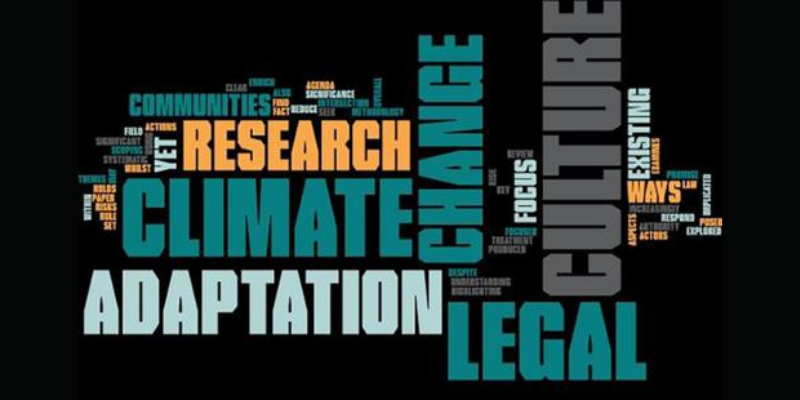The impact of legal culture on climate adaptation - what do we know?
Eric Hoddy explores the relationships between everyday risk perceptions and ‘legal culture’ - what influence do they have on the potential for transformative change?

Eric Hoddy, IGDC Member and Lecturer at the Centre for Applied Human Rights (CAHR), shares with us findings from a recent scoping review on climate adaptation and legal culture undertaken with WIREs Climate Change
Our recent scoping review comes out of a collaborative interdisciplinary project, TRANSIST, undertaken between Lund University Centre for Sustainability Studies (Emily Boyd and Christine Wamsler) and the University of York Department of Environment and Geography and Stockholm Environment Institute (Jon Ensor), York Law School (Simon Halliday) and CAHR (myself). The project is broadly sociolegal in approach and is seeking to shed light on the relationships between everyday risk perceptions and ‘legal culture’ - and their influence on the potential for transformative change.
As a precursor to project fieldwork, which is taking place in Maputo, Mozambique, we carried out this review to examine the intersection of climate change adaptation and ‘legal culture’ in the recent scholarship. This intersection appeared to us to be rather underexplored - even if law and legal authority appear implicated in most, if not all of the ways in which actors seek to reduce climate risks.
‘Legal Culture’ framework
What’s captured by the notion of ‘legal culture’ are multiple, interrelated sociolegal phenomena or dimensions that characterise the contexts for adaptation interventions, policy and programming and the communities where these touch down. We drew on Sally Engle Merry’s framework that describes legal culture in terms of:
- legal practices, which concerns the way legal institutions operate, this includes informal legal institutions in situations of legal pluralism
- legal attitudes, which refers to the beliefs within a community or society about the place of a legal order in social life
- legal mobilisation, which refers to the social practice of turning to law in search of solutions to problems
- legal consciousness, which focuses particularly on people's orientations toward legality
Is the concept of ‘Legal Culture’ embraced in Research?
Initial scans of the adaptation literature revealed little or nothing that has been using these sociolegal concepts. Yet it seemed likely that some researchers have been discussing or considering similar or related phenomena through different conceptual frameworks. For example, empirical work on ‘social norms’ could include what research participants might frame in terms of legality. Our response was to produce a search string that included concepts and synonyms related to legal culture and we applied this to a selection of 10 key journals.
What we confirmed was that while selected studies may not be using the sociolegal concepts outlined above, researchers are nevertheless engaging with the ideas. We present these findings in the review by way of the 4-part legal culture framework identified above. In relation to legal practices, some studies focused for example on the gap between laws and their implementation or enforcement. For instance, the failure of officials to enforce prohibitions of environmentally destructive practices. Legal attitudes were treated to some extent, for example in community perceptions of the formal legal order. Studies considering community recourse to legal mechanisms or the symbolic mobilisation of the law point to some research around legal mobilisation. And in relation to legal consciousness, one study considered people’s orientations towards legality as a feature of legal mobilisation while others treated communities’ failures to comply with local laws and regulation or to view these as useful.
A further finding was that selected studies are engaging with these ideas to different degrees. In some studies, legal culture ideas are central while in others they are more peripheral. Key to note again is that none of these studies are using legal culture terminology. Overall, we felt that explorations of the intersection is likely to be in its infancy but that legal culture may have a lot to offer the field.
With this in mind, our review reflects more broadly on the potential value of a legal culture analytic in treating the sources of climate vulnerability and the barriers to adaptation. Within this treatment we stress the need to recognise how legal culture unfolds in legally plural environments, where legality may be associated with customary, community, and religious institutions and systems and not merely that belonging to the state.
Moving forward
We outline a brief and non-exhaustive list of research directions that include:
- everyday practices of circumventing or “breaking” the law and how this might shape the ways climate vulnerability becomes entrenched
- elite capture of legal systems, including informal systems, and the everyday practices of key legal officials and whether and how this accentuates vulnerability
- legal culture within institutional and governance processes and contexts and how this may generate barriers to adaptation. For example, when legal culture may reflect wider cultural norms around gender and where women are deterred from accessing legal mechanisms
- And how legal culture may be bound up with identities of those exposed to climate risk.
| Features Researcher | Eric Hoddy |
|---|---|
 |
IGDC Member Eric Hoddy is a social scientist with research interests in climate and development, human rights and social movements, human rights leadership, and transitional and transformative justice. His most recent research focuses on climate adaptation and legal consciousness in urban informal settlements, and transformative justice in transitional and post-conflict settings. Profile |
Contact us
Interdisciplinary Global Development Centre
igdc@york.ac.uk
01904 323716
Department of Politics and International Relations, University of York, Heslington, York, YO10 5DD, UK
Twitter
Contact us
Interdisciplinary Global Development Centre
igdc@york.ac.uk
01904 323716
Department of Politics and International Relations, University of York, Heslington, York, YO10 5DD, UK
Twitter